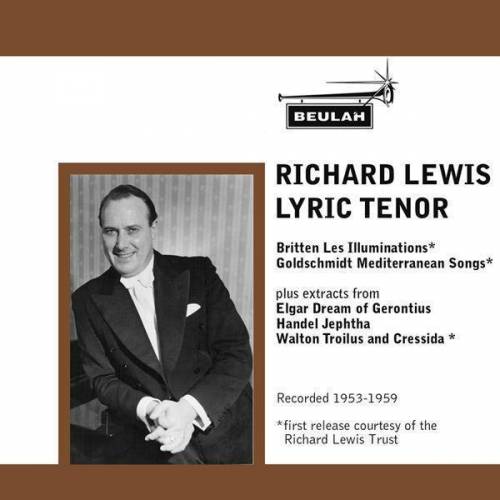|
Over
the past 25 years Beulah has
received many
acclaimations.
|
"The
Beulah
record label has always been one of the most idiosyncratic, and
therefore perhaps most interesting, of reissue marques. While the basic
character of Beulah remains the same as in its Compact Disc days, the
range of its present catalogue, driven now by the ease of downloading,
has been extended in remarkable fashion. Browsing the Beulah catalgue
is now rather like being in a 78rpm record shop: there are plenty of
recordings of short pieces available to whet your appetite for either
repertoire or artist, while at the same time there are numerous full
length works available if you wish to consolidate your collection with,
for instance, major symphonies. All of Beulah's transfers, as might be
expected of a distinguished reissue label, are of very high quality."
David Patmore writing in Classical
Recordings Quarterly
New for January
Many music lovers miss the sound from vinyl pressings.
Many others have yet to discover how pleasant the sound can be.
Most of our albums are mastered from vinyl LP pressings and earlier
recordings (before 1953) from 78 rpm discs. It is our ability to
recreate, in the digital age, the sound from the disc era that many of
our customers find most enjoyable.
Unlike modern digital recordings tracks in our
albums do contain some distortion, and the occasional surface noises,
but for many listeners these "defects" are soon forgotten.
Our albums are available from many and
streaming sites.
We highly recommend downloading from to
Qobuz where you can download or stream in high quality, for
the
same price as iTunes medium quality
New albums
What the Critics Say
"There are many very fine more recent recordings
of
Der Hirt auf dem Felsen but none to excel Suzanne Danco’s classic
account which has come up sounding very well in this transfer. Brendel,
too, recorded the Impromptus again, but these early recordings are full
of the youthful blend of enthusiasm and sensitivity which brought him
to our attention in Mozart and Schubert on the likes of Vox and World
Record Club before Philips snapped him up. No.3 is the beautiful
Rosamunde-inspired Impromptu. The piano tone is a little harsh, which
is typical of these early Brendel recordings, but it’s not a serious
problem.
"This typically well-filled Beulah album is well
worth having for these three tracks alone but the classic Végh Quartet
account of String Quartet No.13, not otherwise available except in
multi-CD sets, is the cherry on top. Like Impromptu No.3, the slow
movement is derived from Rosamunde. It’s almost as sublimely wistful as
that of Schubert’s String Quintet and the Végh players bring out that
quality eminently well.
The 1933 Henry Wood Unfinished is more of a
curiosity, though sounding surprisingly well for its age, with just a
little surface noise. The performance is interesting for the fact that
Wood moves the first movement along faster and keeps the listener’s
interest better than many more recent recordings which sometimes end up
sounding like two slow movements; he’s faster, for example, than the
very fine Norrington recording on period instruments (Erato) and much
faster than Claudio Abbado (DG).
"This is an attractive release, best downloaded or
streamed from Qobuz – follow link – in lossless sound rather than in
mp3 from other sites."
Brian Wilson at MUSICWEB
INTERNATIONAL where you can read the full review
REISSUE OF THE MONTH
"More recent and better-recorded versions of these
works there may be – for example, Howard Shelley with the London Mozart
Players in the Mendelssohn or Stephen Hough with CBSO and Lawrence
Foster in the same coupling plus Rondo Brillant and Serenade and
Allegro – but these Moura Lympany recordings were well worth reviving
and not just out of a sense of nostalgia.
"
The automatic reaction is to say that Lympany is at her best in the
gentler music but, though those more expert than me on the Rachmaninov
Preludes have sometimes thought her playing a little lacking in
muscularity, I found that she sheds light on all these works, not least
the often-under-rated Saint- Saëns: LS thought the performance ‘fluent
and sparkling’ back in 1951 and I couldn’t put it better.
"The earliest recording, from 1945, is rather dry
but acceptable and transferred with hardly a hint of 78 surface noise.
The 1951-2 recordings have come up sounding very well, if a little
over-bright and a trifle congested at times in the Khachaturian.
If the three Rachmaninov Preludes prompt you to explore Lympany’s
complete 1951 recording, you can find that on an inexpensive Naxos
Classical Archives download .
Alternatively, they are available on a 2-CD download-only Decca set,
with Piano Concerto No.3 and the Khachaturian but the Beulah selection
will be enough for many listeners, especially as this is the only way
to obtain the Saint-Saëns short of one of two multi-box Decca sets."
"
Brian Wilson at MUSICWEB
INTERNATIONAL where you can read the full review
"The Ansermet items are particularly
recommendable.
The Russian Easter Festival Overture is my favourite Rimsky work.
"
Piero Gamba’s Rossini Overtures were also a classic of their time.
Beulah’s offering of this lively account William Tell is very enjoyable
in its own right.
Several of these were Decca demonstration-quality in their day and they
still sound well in these transfers. Only the Mercury Antal Doráti
1812 brings out bigger guns than this Kenneth Alwyn recording – shades
of those Sunday evening concerts with live cannon blackening the Albert
Hall.
Cluytens’ Beethoven is always worth hearing, too. That’s five strong
recommendations, then, with some other attractive recordings thrown in.
All the transfers sound good or very good for their age.
."
Brian Wilson at MUSICWEB
INTERNATIONAL where you can read the full review
JAZZ REISSUE OF THE MONTH
"
Stéphane Grappelli (violin) and Django Reinhardt (guitar) made a
number of recordings with the Quintet of the Hot Club de France between
1935 and 1946 and some of these have been gathered with the title St
Louis Blues on a BEULAH release,1PS22[69:49]. It’svailable in mp3
but the best download is in lossless sound, as reviewed from a press
preview, from Qobuz for the same price (£7.99). The contents of this
self-recommending and highly enjoyable album are:
- St. Louis Blues [3:31]
- I Got Rhythm [2:59]
- I Found a New Baby [3:06]
- It Was
So Beautiful [2:53];
- China Boy [3:04]
- Moonglow [3:04]
- Limehouse Blues [3:14]
- It Don’t Mean a Thing [3:06]
- Billets Doux [2:57]
- Swing from Paris [2:34]
- Them There Eyes [3:04]
- Three Little Words [2:55]
- Appel Direct [3:01]
- Swing 39 [3:20]
- Honeysuckle Rose [2:56]
- Night and Day [2:44]
- Only the classic parody of Nazi stormtroopers
marching on a doctored film to the Lambeth Walk is more enjoyable than
the performance of that work on the final track.
The 78s transfers have come up sounding very
well.
Brian Wilson at MUSICWEB
INTERNATIONAL where you can read the full review
" The 1951 SULLIVAN concoction ballet Pineapple Poll, ... is especially
delightful when performed by its begetter,
Sir Charles Mackerras. Beulah have already reissued the Eastman Wind
Ensemble recording of the suite but their new reissue is better still,
especially when coupled as it is here with that other Mackerras
confection, this time from VERDI, The
Lady and the Fool. There’s a budget-price Classics for Pleasure
coupling of both suites with Mackerras and the LPO, but the Beulah
reissue on 1PS10 restores the Royal Philharmonic Orchestra (1962,
ADD/stereo) and the Philharmonia (1955 ADD/mono), both with Mackerras.
It’s due for release in March 2017.
"
This definitive account of Pineapple
Poll when first released and again when reissued took a whole
LP, as did The Lady and the Fool
in 1956. With more generous selections than on the CFP album – the
complete Lady, not just the
suite – Beulah give us over 97 minutes. The 1962 recording has come up
as fresh as paint and the 1955 is very good for its age, clear if a
trifle dry and with a touch of end-of-side insecurity in the Epilogue. "
Brian Wilson at MUSICWEB
INTERNATIONAL where you can read the full review
|

|

|
"A more significant memorial to (Tibor) Paul’s
work
in Australia is a 1957 performance of Britten's Les Illuminations,
in which the tenor soloist was Richard Lewis. The performance was given
in Melbourne, with Paul conducting the Victoria Symphony Orchestra. The
recording is clear but with some distortion on Lewis' heavier notes.
Those who find Peter Pears' timbre too strangulated to compensate for
his artistry will surely welcome Lewis’s fuller tone, though he, too,
has a looser vibrato than one might wish. Paul conducts with a good
deal of point. Since the tempi seem perfectly gauged to Lewis’s voice,
and in the absence of any other recorded
performance by Lewis, there is no reason to suppose that Paul had
anything to do with the fact that this, at 25’ 09”, could be the
slowest performance on record. The Pears/Britten takes 22’ 16”; Pears
with Colin Davis live at the Concertgebouw in 1966 has a virtually
identical timing. This may be a natural consequence of Lewis’s fuller
timbre, though we can hear, as early as the violin solo that concludes
“Fanfare”, that Paul was inclined to tweak the music towards Mahlerian
post-romanticism. Despite Britten's later insistence that the cycle
should be sung by a tenor – it was originally sung by the Swiss soprano
Sophie Wyss – my own favourite is Suzanne Danco. Backed by Ernest
Ansermet's magical, and unromantic, ear for texture, this 1953 Suisse
Romande performance is a wonderful celebration of light and,
incidentally, possibly the fastest ever, at 20’ 22”. Again, the tempi
may be a consequence of a light vocal timbre and an easy technical
fluency. There is no sense of hurry, any more than there is any sense
of heaviness in the Lewis/Paul version."
Christophr Howell at
Musicweb International
|
